History is so much more than military conflicts, imperialism, and legal documents. Culture and all its facets—art, nature, technology, architecture, medicine, and beyond—is at the root of everything, laying the groundwork of society. And while culture can be the cause of war and may even crumble at the hands of it, it is its own concept which develops and evolves over time. From the buzzing influence of honey bees to the growing craze of celebrity worship, here are 10 insightful books which will expand your knowledge of the vastly changing world around us.
Related: Rediscover the World Around You With 7 Accessible Ethnographies
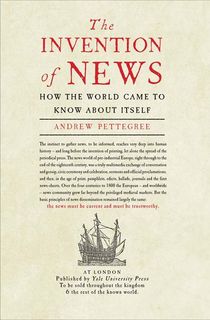
The Invention of News
Though it might seem hard to imagine, the business of news was alive and well long before the invention of printing. People have always wanted to stay tapped into local and global knowledge, and in a pre-industrial time, news was spread by word of mouth—via gossip, sermons, and proclamations. When the age of print rose, this changed the spread of news to pamphlets, posters, and, of course, newspapers.
Related: 6 Historical Political Cartoons That Capture the Hopes and Fears of the Past
In this book, historian Andrew Pettegree traces the development of news in 10 different countries through 400 years. Taking this history one step further, he examines how news has impacted contemporary events and changed the lives of the general public.
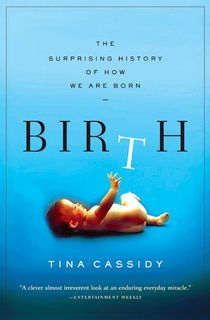
Birth
For all of us, life begins with birth. But how has the process of giving birth changed over time? Former Boston Globe editor Tina Cassidy delivers a gripping and keenly researched cultural history of childbirth, from midwives to the epidural and beyond. Every generation seems to have different beliefs when it comes to birth, and beliefs vary even more widely from culture to culture. This text explores the physical, anthropological, political, and religious factors that influence the ways in which humans give birth.

Ambition, A History
Ambition is the foundation of the American Dream, giving rise to the backbreaking push for individuals to achieve their own personal rags to riches triumph. However, when America was founded, ambition was considered to be a vice so dangerous that it was often seen as the catalyst for original sin. This book taps into sources and authors from Dante and Machiavelli to Shakespeare and Thomas Jefferson to trace the startling evolution of ambition in society, from classical antiquity to America's founding.
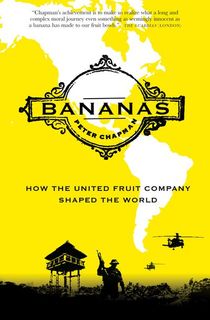
Bananas
In today's society, the banana is a fruit often taken for granted—but its journey from tropical regions to our grocery store shelves wasn't so simple. Financial Times writer Peter Chapman provides an intriguing history of this beloved fruit, as well as a history of the United Fruit Company. This big business was founded on deceit, violence, and controversy, setting the scene for institutional greed across multinational companies. From the marketing of the banana as the first fast food to a bloody Guatemalan coup, this true story will shock you at every turn.
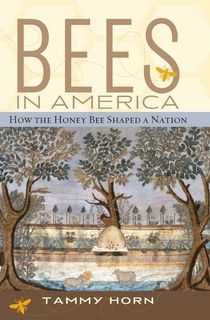
Bees in America
Whether bees incite delight or fear within you, there's no denying they've inserted themselves into every aspect of our culture, from art to advertising to common language. Honey bees and their associated values have played a part in American culture for 400 years. As our diverse country has evolved, bees and their keepers have stood as a symbol of order and stability. This social and technological history traces bees from the colonial period when they were first brought to the New World to the modern day.
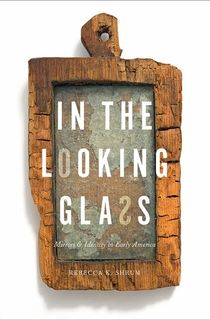
In the Looking Glass
This fascinating texts explores the ways in which early Americans of Indigenous, European, and African descent interacted with mirrors. For many cultures, reflective surfaces were first associated with magic and ritualism. But what changes occurred when they were utilized for familiarizing an individual with their own appearance?
In this anthropological study, author Rebecca K. Shrum makes connections betweens mirrors and the cultural ways in which white European men dominated and modernized the world around them. Framing mirrors as an object of truth and rationality, white men not only differentiated how they used mirrors in comparison to white women, but in comparison to Native Americans and African Americans. Through this posturing, mirrors played an essential roll in the development of early racial and gender hierarchies in America.

The Golden Thread
In ancient Mesopotamia, simple shapes were used to record the exchange of goods and services. In modern society across the world, computers use highly sophisticated typographical resources for communication. Writing has a rapidly expanding history with an origin that dates back centuries. Ever since our ancestors shifted their nomadic way of life to an agrarian system, writing has became the ideal way to share information and ideas, as well as a vessel for cultural, scientific, and political advancement.
Related: The Curious Histories Behind 4 Dead or Dying Languages
In this book, calligraphy expert Ewan Clayton examines the social and cultural impact of the invention of the alphabet, the replacement of the papyrus scroll with the codex in the late Roman period, the perfecting of printing using moveable type in the 15th century and the ensuing spread of literacy, the mass production of printing during the Industrial Revolution, the impact of artistic Modernism on the written word in the early 20th century, and more.

Dead Famous
In today's world, it's hard to do much of anything without being confronted with the widespread popularity of one celebrity or another. In advertisements, on social media, through gossip—celebrity worship is everywhere. But where did this obsession with fame come from?
It all began far earlier than you might think. This history account covers a vast period spanning from the Bronze Age to Hollywood's Golden Age. It examines more than 125 famous individuals, from the scandalous Lord Byron, whose poetry apparently sent female fans into an erotic frenzy, to Edmund Kean, the dazzling Shakespearean actor whose monstrous ego and terrible alcoholism saw him nearly murdered by his own audience, and beyond. Author Greg Jenner takes a look at how celebrity blossomed in the early 18th century, and how it contrasts to the ancient concepts of fame. He also examines celebrity's influence on public tastes and the psychological burden of stardom.

Naked Airport
There is no structure so completely modern as the airport. Though they got their start as muddy fields acting as a playground for flying machines, airports have developed into sharp paragons of modernity instituted across the globe. This book touches on how airports play a role in everything from geopolitics to movies to commutes, impacting our sense of time, distance, travel, style, and even our city infrastructures.

The Age of Wood
Humans have come a long way since our rise as the dominant species on Earth. But how have we made such quick and revolutionary strides? It all ties back to our relationship with wood.
Related: 10 Books to Read for Earth Day
This book looks back at global advancements through the lens of the human exploitation of wood. This natural resource has impacted our bodies, minds, cultures, and lives in innumerable ways. From East Africa, where hunter gatherers used wood in the collection of food, to the wooden temples in China and Japan and beyond, The Age of Wood portrays the essential role trees have played in our history and evolution.
This post is sponsored by Open Road Media. Thank you for supporting our partners, who make it possible for The Archive to continue publishing the history stories you love.
Featured image: Eberhard Grossgasteiger/Unsplash.




